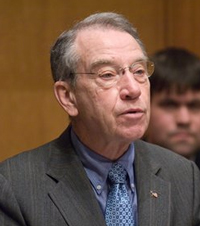Senator Chuck Grassley (R-IA) has received a response from the Environmental Protection Agency explaining the decision to include indirect land use change in calculating estimates of lifecycle greenhouse gas emissions for biofuels, but the senator still believes it should not be a factor in the Renewable Fuels Standard.
According to the letter from EPA acting assistant administrator Elizabeth Craig, the agency is required under the Energy Independence and Security Act of 2007 to include indirect land use in its estimates of the carbon footprint of biofuels. “The statute specifically includes ‘significant emissions from land use changes’ within the concept of indirect emissions,” she said. “Excluding indirect land use changes – whether domestic or international – from the analysis would depart from both the statutory text and from the scientific thrust of the requirement of lifecycle analysis.”
 During his weekly conference call with farm reporters on Tuesday, Grassley said he had not yet received a response, but believes that indirect land use “doesn’t meet the common-sense test.”
During his weekly conference call with farm reporters on Tuesday, Grassley said he had not yet received a response, but believes that indirect land use “doesn’t meet the common-sense test.”
“Because, first of all, there’s no science behind it and EPA ought to only be making their decisions based on science,” Grassley said. “And then you get into the ridiculous situation that somewhere around the world somebody’s waiting to plow up an acre of virgin soil just because they’re waiting to see if Chuck Grassley sells a little more corn for ethanol. I think that’s a ridiculous combination that doesn’t face the real-world test.”
Grassley admitted that he didn’t think the land use issue was “a big deal” when he voted for the energy bill. “Now, obviously, it could be a big deal if it’s used to make ethanol look less environmentally positive or even environmentally negative. And taking it out would be the only way to make sure it wasn’t used,” he said.
By “taking it out” Grassley means Congress would have to change the law unless EPA decides not to use indirect land use calculations because of a lack of scientific consensus.

